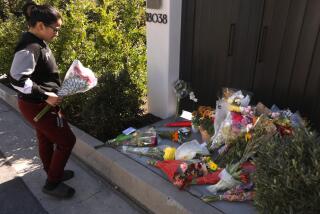Puzzling cliffhanger in the case of a poisoned Chicago lottery winner
- Share via
Reporting from Chicago — With his departure from office this week, a county medical examiner leaves behind a beguiling mystery set in motion more than three years ago with his sensational declaration that a Chicago businessman who had just won a $1 million lottery prize was poisoned by cyanide.
Cook County Medical Examiner Stephen Cina’s finding that Urooj Khan’s death was a homicide led to the exhumation of his body, divided his family and drew flocks of international reporters to Chicago to cover the story.
Cina, whose last day in office was Sunday, told The Associated Press he had not heard so much as a peep from police since handing the case over to them in early 2013.
Estranged family members who had voiced vague suspicions about Khan’s wife or her father have quietly gone on with their lives. Attorneys for the man’s wife say they’ve heard nothing and believe the investigation stalled shortly after police questioned her in January 2013.
“Yeah, I think the case has become dormant,” said Al-Haroon Husain, an attorney who represented Khan’s wife in a bitter probate fight with her stepdaughter and late husband’s siblings over his lottery winnings and the rest of his estate. He’s not even convinced there was foul play, adding that he thinks “the police have just stepped away.”
Over the course of nearly four years, police say they have interviewed three family members: Khan’s wife, daughter and father-in-law, who all had dinner with him the night he died. No one has ever been charged. But detectives are continuing to talk with family members, police spokesman Anthony Guglielmi said Friday.
“It is still very much an open and active investigation,” he said, without getting into any specifics on progress, potential suspects or theories.
NEWSLETTER: Get the day’s top headlines from Times Editor Davan Maharaj »
Khan, who moved to the U.S. from Hyderabad, India, in 1989, ran dry-cleaning businesses with his wife in the West Rogers Park neighborhood on Chicago’s Northwest Side. Relatives said he was hard-working and generous and donated money to orphanages in India.
Though the increasingly devout Muslim had sworn off gambling after a religious pilgrimage to Saudi Arabia, Khan bought a scratch-off lottery ticket at a 7-Eleven near his home in June 2012. To his astonishment, it was a $1 million winner. He was going to use the money to pay off mortgages, expand his business and give a donation to a hospital.
But the 46-year-old with big dreams died on July 20, 2012, after eating dinner and going to bed. It was one day after the lottery check was issued but before he received it. Initially, the medical examiner’s office ruled he died of natural causes after an external exam turned up no signs of trauma. No autopsy was conducted at the time. The default cause of death was listed as arterial sclerotic cardiovascular disease, which covers the major natural causes of death, such as a stroke or a heart attack.

But the man’s anguished brother had doubts. The timing of the death and tension over the lottery win made him suspicious, he told the Chicago Tribune in 2013. At his urging, pathologists tested a peripheral blood sample that had been kept.
According to Cina, who became the chief medical examiner that September, the test came back positive for cyanide. He reclassified the death as a homicide, emphasizing that he did not believe the lethal dose could have been ingested by accident. An outside lab confirmed the results.
Khan’s body was exhumed in January 2013 for further tests, but by then no cyanide was detectable in the badly decomposed remains, and it was impossible to tell how the lethal dose entered his body, Cina said in a news conference a few weeks later.
But he emphasized the county medical examiner’s office had a good record, with no false positives on 340 cyanide tests on bodies over a two-year period leading up to the Khan case.
Cina said police never reached out to him after his involvement in the case ended in the spring of 2013.
See more of our top stories on Facebook »
Meantime, Khan’s wife, Shabana Ansari, continues to work at the dry-cleaning businesses. On a recent afternoon, she was hanging a shirt on an overhead conveyor at one of them as a handful of employees milled around. She refused to talk with a reporter.
Steven Kozicki, a criminal defense lawyer she hired after police questioned her for 4½ hours without an attorney in 2013, says he’s instructed her not to talk anyone, including police, who he says have not tried to follow up in a couple of years.
Guglielmi says Ansari refused requests to sit for a polygraph test.
Khan’s daughter from an earlier marriage, who decided to live with an aunt after her father’s death, is now a student at Loyola University Chicago.
A probate settlement split Khan’s estate — including the lottery check — between her and her estranged stepmother and barred either side from filing a wrongful death lawsuit against the other unless the police investigation turns up evidence.
“Everybody has their suspicions and innuendos but at the end of the day at a certain point no matter what it is you just have to move on with your life,” said the wife’s attorney, Husain.
ALSO
Georgia police officer responds to wrong house and shoots owner
Man charged with murder in deaths of 5 bicyclists in Michigan
Windblown beach umbrella hits and kills woman in Virginia
More to Read
Sign up for Essential California
The most important California stories and recommendations in your inbox every morning.
You may occasionally receive promotional content from the Los Angeles Times.










